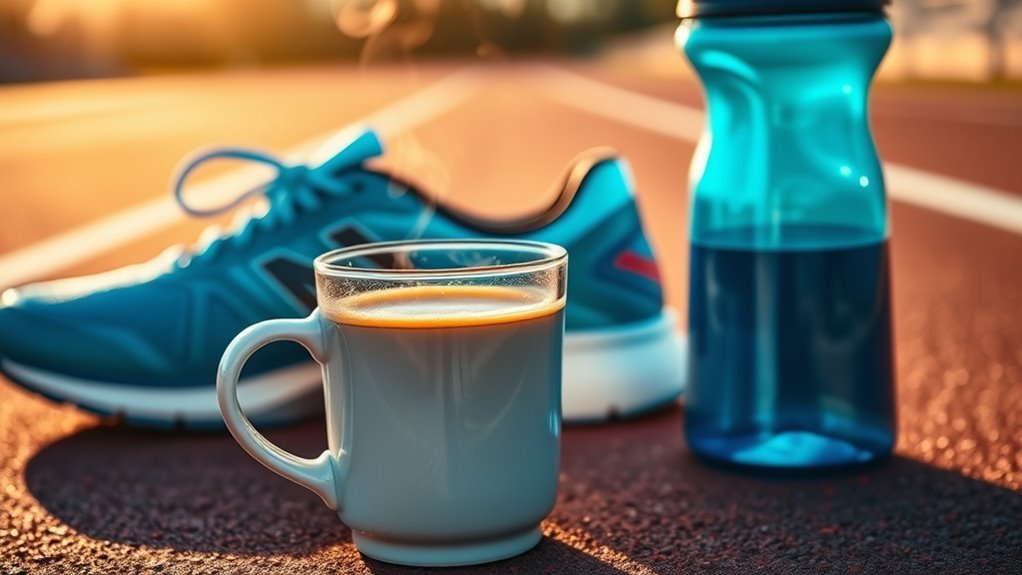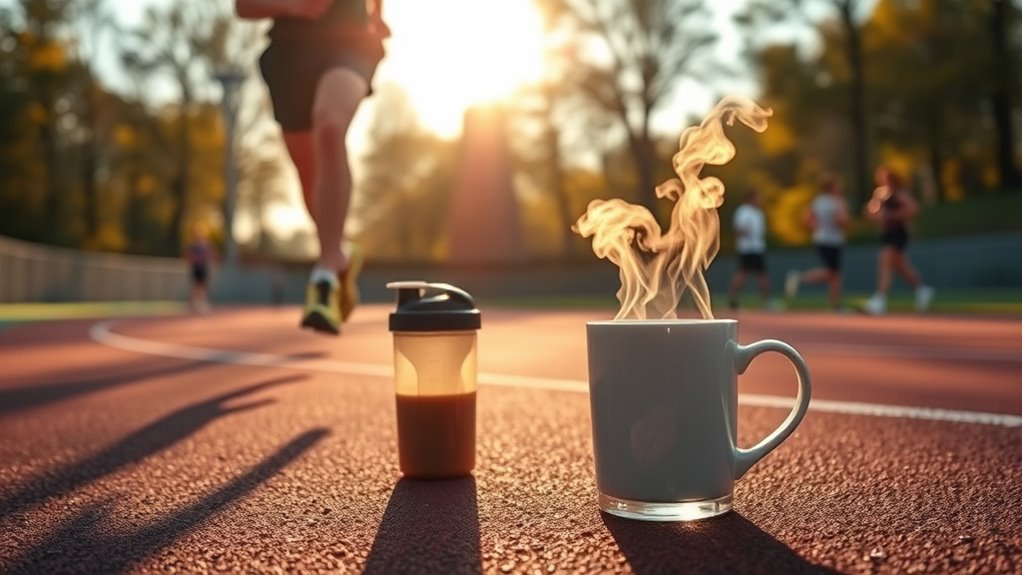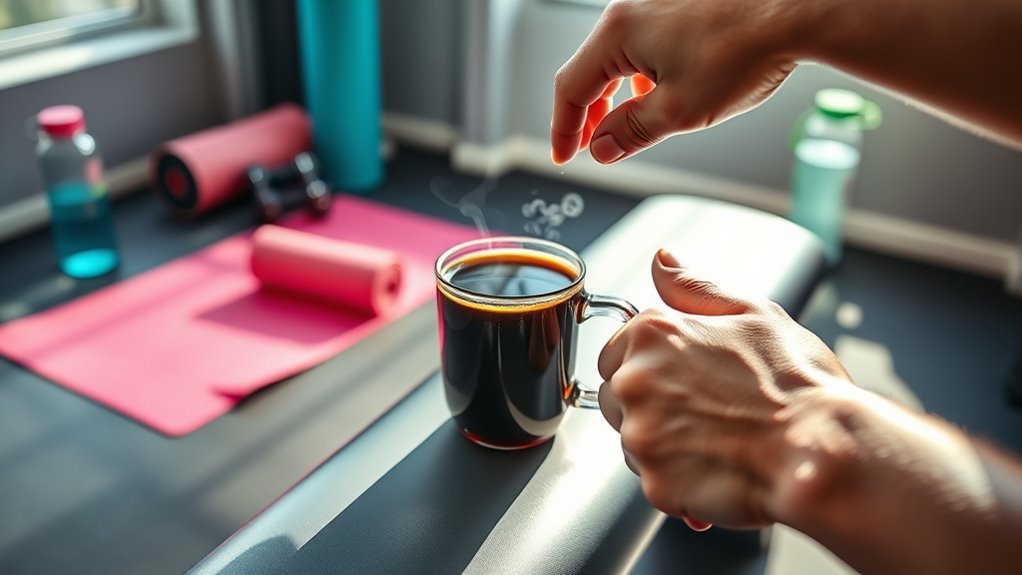Coffee and Athletic Performance: How Coffee Can Boost Your Workout
If you want to boost your workout, drinking coffee about 45 minutes before can help. Caffeine increases alertness, reduces perceived effort, and mobilizes fat for energy, letting you train longer and harder. Aim for 3–6 mg per kg of body weight but stay under 400 mg daily to avoid jitters and dehydration. Pair coffee with good hydration and nutrition for best results. Keep exploring to see how timing, workout type, and safety tips optimize your performance.
The Science Behind Caffeine and Exercise

Although caffeine is best known as a stimulant, its effects on exercise go beyond simply making you feel more awake. When you consume coffee, caffeine metabolism kicks in, breaking down caffeine into active compounds that influence your central nervous system. This interaction enhances alertness and reduces perceived effort during workouts. From an exercise physiology perspective, caffeine increases the release of adrenaline, which boosts heart rate and mobilizes fat stores for energy, sparing muscle glycogen. This allows you to exercise longer and with greater intensity. Understanding these mechanisms helps you use coffee strategically, optimizing your performance without overreliance. By timing your caffeine intake appropriately, you can harness its benefits while maintaining control over your training, ultimately supporting your freedom to push boundaries and achieve your fitness goals.
Benefits of Coffee for Different Types of Workouts
When you tailor your coffee intake to the type of workout you’re doing, you can maximize its performance benefits. For endurance training, caffeine in coffee helps delay fatigue by increasing fat oxidation, allowing your muscles to conserve glycogen longer. This means you can push farther and maintain energy during long runs or cycling sessions. In strength workouts, coffee enhances muscle contraction and reduces perceived exertion, letting you lift heavier and complete more reps with less discomfort. It also supports quicker recovery by improving blood flow and reducing muscle pain after intense sessions. By understanding these benefits, you can strategically use coffee to fuel different workout goals, giving you the freedom to optimize performance whether you’re building stamina or power.
Optimal Timing and Dosage for Pre-Workout Coffee
Since caffeine takes about 30 to 60 minutes to reach peak levels in your bloodstream, timing your coffee intake before a workout is essential for maximizing its effects. To optimize pre workout timing and caffeine dosage, consider these guidelines:
- Drink your coffee 45 minutes before exercise to align with peak caffeine absorption.
- Aim for 3–6 mg of caffeine per kilogram of your body weight for effective performance enhancement.
- Avoid exceeding 400 mg daily to maintain safety and avoid diminishing returns.
- Tailor your caffeine dosage based on your tolerance and workout intensity for best results.
Potential Side Effects and How to Avoid Them

Because caffeine affects everyone differently, you might experience side effects like jitteriness, increased heart rate, or digestive discomfort if you consume too much or time it poorly. If you have high caffeine sensitivity, even small amounts can cause these effects. To avoid this, start with a low dose and monitor how your body reacts. Also, caffeine is a mild diuretic, so dehydration risks increase if you don’t hydrate properly. Drink plenty of water before, during, and after your workout to maintain balance. Avoid consuming coffee too late in the day to prevent sleep disturbances, which can impair recovery and performance. By understanding your personal tolerance and staying hydrated, you can safely harness coffee’s benefits without unwanted side effects.
Combining Coffee With Other Performance Strategies
Although coffee can boost your alertness and endurance, combining it with other performance strategies can maximize your results. To access your full potential, consider these practical approaches:
- Pair coffee blends with balanced performance nutrition, focusing on carbs and proteins to fuel and recover muscles effectively.
- Time your caffeine intake about 30-60 minutes before workouts for peak alertness and stamina.
- Incorporate dynamic warm-ups and mobility exercises to complement coffee’s energizing effects and reduce injury risk.
- Stay hydrated—coffee is a mild diuretic, so drink water throughout your session to maintain peak performance.
Frequently Asked Questions
Can Decaffeinated Coffee Improve Athletic Performance?
Think of decaf benefits as a gentle breeze rather than a gust of wind—it won’t give you the same jolt as caffeine but can still support hydration and antioxidants. While decaffeinated coffee lacks caffeine’s direct performance enhancement, it may aid recovery and reduce inflammation. So, if you’re sensitive to caffeine or want to avoid jitters, decaf can be a practical choice that supports your workout freedom without sacrificing overall wellness.
Does Coffee Affect Hydration Levels During Exercise?
You might worry that coffee hydration is compromised because caffeine is a diuretic, but moderate coffee intake doesn’t greatly dehydrate you during exercise. Research shows your body adapts, and the mild diuretic effect won’t offset fluid balance if you drink water alongside coffee. So, you can enjoy coffee without fearing dehydration, just stay mindful of fluid intake to maintain ideal hydration during your workout sessions.
How Does Coffee Consumption Impact Muscle Recovery?
Like a gentle breeze easing tension, coffee can help reduce muscle soreness after intense workouts. Caffeine blocks adenosine receptors, lessening pain perception and helping you bounce back quicker. Studies show it may shorten your recovery time, allowing you to stay active and free in your routine. Just remember, balance is key—too much caffeine might interfere with sleep, which is essential for muscle repair.
Is Coffee Beneficial for Endurance Athletes Only?
No, coffee isn’t just beneficial for endurance athletes. Different coffee types provide varying caffeine levels, which can enhance focus and performance across many sports. However, your caffeine sensitivity matters—if you’re sensitive, even small amounts might cause jitters or disrupt sleep. So, it’s practical to experiment with coffee types and doses to see what suits your activity and body best. This way, you maintain freedom while optimizing performance safely.
Can Coffee Replace Sports Drinks During Workouts?
You shouldn’t rely on coffee to replace sports drinks during workouts completely. While coffee benefits include improved focus and alertness, it lacks the electrolytes and hydration sports drinks provide. For ideal workout efficiency, especially during intense or long sessions, you need fluids and minerals to prevent dehydration and cramps. Coffee can be a helpful stimulant but doesn’t offer the thorough hydration sports drinks deliver, so use it as a complement, not a substitute.






